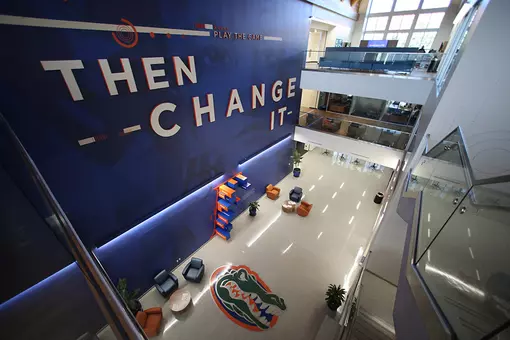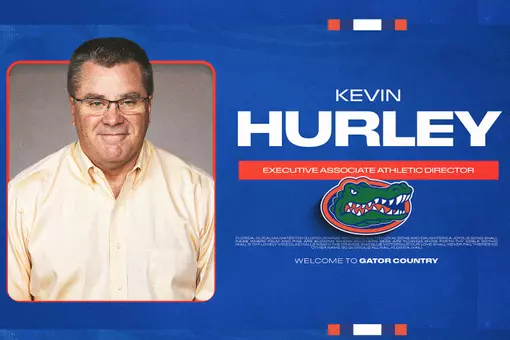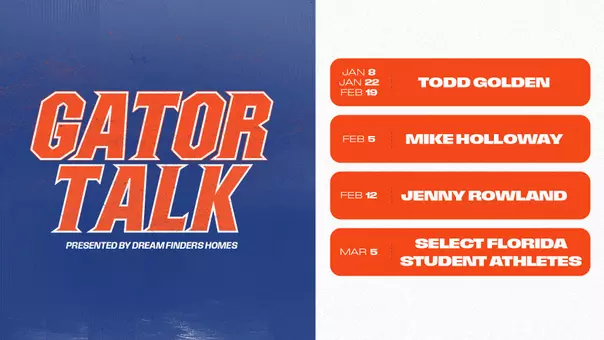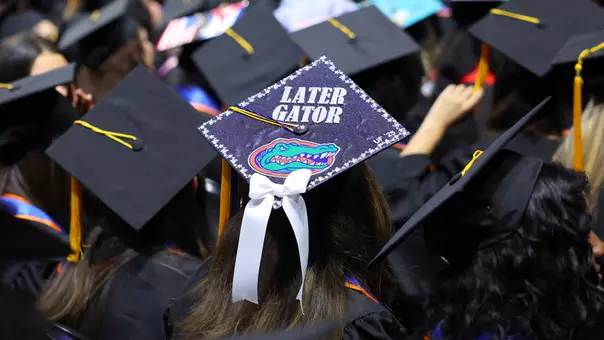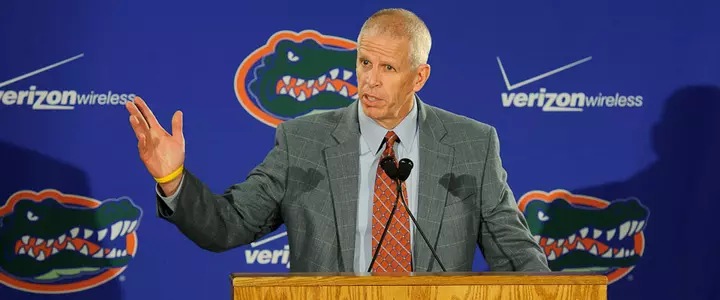
Jeremy Foley, nw 63, spoke from a lot of podiums during his time as Florida athletic director (like this one in 2014), but the first time was March 9, 1992 at the age of 39.
The Ideal AD Front Man
Monday, June 13, 2016 | General, Chris Harry
A retrospective of Jeremy Foley's UAA reign.
 GAINESVILLE, Fla. — The news Monday that Athletic Director Jeremy Foley was retiring, effective Oct. 1 after nearly 25 years on the job, got me reminiscing about just where the University Athletic Association was the first time I arrived on the scene as a beat reporter for The Tampa Tribune.
GAINESVILLE, Fla. — The news Monday that Athletic Director Jeremy Foley was retiring, effective Oct. 1 after nearly 25 years on the job, got me reminiscing about just where the University Athletic Association was the first time I arrived on the scene as a beat reporter for The Tampa Tribune. The year was 1990. The football and basketball programs were winding down an ugly NCAA investigation several years in the making. The AD at the time, Bill Arnsparger, was a no-nonsense type who was brought in during the height of the mess to play bad cop and navigate the Gators through the ugliest chapter in their history.
It was a news-breaking free-for-all. A lot of time on the telephone, a lot of scribbling in the pad.
"Call me anytime," Arnsparger would often say.
When you did call him, Arnsparger usually said next to nothing. Or he might say, "I'm not sure about that, you better check with Jeremy."
Foley may have been second in command at the UAA, but by ascending from ticket office intern to senior associate athletic director he was involved in all facets of the program. He was accessible, informed, quotable and savvy in his role with the media. He was the anti-Arnsparger whose time would come. When it finally did, UF had an administrative front man at the top of his profession. His charisma was a breath of fresh air.
Foley cared about the Gators, but in time I'd find he also cared about people. I know because I saw it from both sides.
For a quarter-century, Foley has ruled an overall athletics program that annually is among the best in the country, ranking in the Top 10 every year on his watch, winning the Southeastern Conference All-Sports Trophy every season but one and capturing 27 national championships. Among UF's coaches he made their "Team Florida" motto matter because it was a creed he lived by. You could tell by the steely look on his face from press row at basketball games, his shouts of "Go Gators" while baking in the sun at tennis matches or his locked-in looks from the first base bleachers at the softball stadium.
The teams — all of them — mattered dearly to him.
"He is leaving a program that is on the top of its game," former UF president Bernie Machen said. "In every corner of the athletic program, you'll find excellence, and that's a tribute to Jeremy. I think he just finally realized that it can't get much better than this, and 25 years is enough time."
It was enough time to build a culture of success — achieved the right way — with an emphasis on building relationships. That was a pivotal part of the Foley business model.
"He created incredible chemistry and cohesiveness in a day and age when coaches in other sports don't always feel they're getting what they need to be successful," said Oklahoma City Thunder coach Billy Donovan, who led the Gators to back-to-back NCAA titles in 2006-07. "He was able to separate himself and look at each sport and understand what they needed to be successful with the idea that he could pull everybody together, with everybody supporting each other."

Foley did not inherit that culture, but did step into a situation — thanks in great part to Arnsparger, who surprised many by leaving UF to become defensive coordinator of the San Diego Chargers — that was ready for his innovative, high-energy imprint. The university conducted a national AD search and even a couple other finalists — Trivia: Dave Hart (East Carolina) and Max Urick (Iowa State) — made the list. But UF president John Lombardi's decision to promote Foley, then 39, was a fait accompli.
The timing was perfect.
So was the choice.
At his news conference on March 9, 1992, Foley spoke of living out a dream. He reflected on his time working in the ticket office when his only goal was "getting out of the ticket office." He had bypassed other opportunities: Minnesota, Wichita State, Washington and South Florida, among them. They did not fit. Only one did.
"I'm a big Gator fan," he said at the time. "I didn't want to go someplace just so my resume said I was AD at Joe State. I wanted to be somewhere I cared about, somewhere that meant something to me."
For sure, Foley was vested in orange and blue. He not only was an expert in UAA operations, but had seen the program crawl from the abyss of the Charley Pell and Norm Sloan eras to take on the squeaky-clean looks of Steve Spurrier and Lon Kruger. Arnsparger had established the foundation, but now Foley was charged with taking things to another level.
The Gators, Foley vowed, would bury their ugly past.
They would not, however, forget it.
"I've heard it said many times this program is going in the right direction, that continuity is important, and if it's not broken, don't fix it," Foley said that day. "But there are greater things for us to accomplish out there. And I don't think I'm alone in thinking that. I believe our coaches will agree with that, too."
Away they went. Together. For nearly 25 years. He will leave to his successor a program known nationally for its across-the-board excellence, proactivity on the compliance front and constant awareness of the importance in protecting the brand. Along the way, Foley made a priority of fostering a UAA family of 400-plus — and he was the patriarch.
Donovan was only 30 years old when Foley took a chance on the energetic up-and-comer loaded with pedigree but low on experience. The young coach was impressionable, so the way Foley operated rubbed off on him.
Especially when it came to dealing with people.
"Competency, intelligence and being really good at your job were important, of course, but what took precedence is that he wanted good, quality people around," Donovan said. "He and I would always use a phrase: 'Just be normal.' By that, be a regular guy. Treat people right. From that perspective, he helped generate a situation for me, because of the environment he created, where I made lifelong friends there I will always keep in touch with."
I can relate.
When I exited the UF beat in 2000 to cover the Tampa Bay Buccaneers, I left behind the most enthralling decade of my journalism career. I was there for six SEC titles, the school's first Final Four and football national championship, two College World Series, plus the inception of women's soccer and softball. Intertwined in those Gators milestones were some not-so-great moments that led to headlines Foley didn't like. I heard about them, too. We often gigged each other about those stories over beers when our paths crossed in hotel lobbies on the road.
Sometimes things got personal.
Like 1993, for example.
Around 5 a.m., my wife went into labor — eight weeks early. I wouldn't make the Gators' road football game that weekend, spending most of my time at the hospital instead. I returned home the next night to a message on my answering machine. It was Foley. He was in Lexington, Ky., where he said a lot of people were thinking about my wife and me and praying everything would be all right. Dozens of flowers from dozens of UAA employees arrived the next week.
Molly Page Harry (all 3 pounds, 11.5 ounces) was born Sept. 11 at 4:05 p.m. Or six hours before Danny Wuerffel hoisted his famous pass into the Bluegrass State night.
"DOERING HAS A TOUCHDOWN! DOERING HAS A TOUCHDOWN! THE GATORS HAVE TAKEN THE LEAD! OH MY!"
Yes, things turned out all right. She graduated from UF six weeks ago, having started her college career about a year after Foley brought me into the UAA fold as a writer at GatorZone (now FloridaGators.com), thus giving me a view of how the culture he created looked and worked from the inside.
My take: Jeremy Foley loved being the AD of the Gators because, above all else, he loved the Gators.
The bar for his successor is higher than Century Tower. Everyone knows it.
"The true testament to Jeremy's loyalty and love of the Florida Gators is this timing. He leaves with every single sport on the upswing and on the verge of being the best of the best," said volleyball coach Mary Wise, set to begin her 26th season this fall. "UF is already one of the premier athletic programs in the country because of his leadership and now the job will be coveted by the top in the business."
He had my attention coming in, my admiration on the way out.
Good luck, Jeremy.
Call me anytime.
Florida Men's Basketball Highlights | Alabama 2-1-26
Monday, February 02
Gator Insider presented by Talon Wealth 1-30-26
Saturday, January 31
Florida Gymnastics Highlights | Arkansas 1-30-26
Saturday, January 31
Florida Men's Golf | One-on-One with J.C. Deacon 1-30-26
Saturday, January 31
